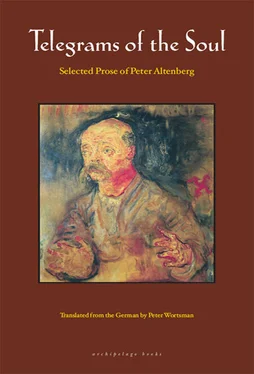“We’re not allowed to dress, Sir, no shoes, not even a head cloth. ‘Take it off,’ says the attendant, ‘take it off. What are you trying to be, some kind of society lady maybe?!’ ”
“Why doesn’t he let you dress?!”
“We’re supposed to represent savages, Sir, Africans. It’s completely crazy. We’d never go around like this in Africa. Everybody would laugh at us. Like ‘bushmen,’ that’s what they look like, that lot. Nobody lives in huts like these. Back home they’d be fit for dogs, gbé. Quite foolish. They want us to be like animals. What do you think, Sir? The attendant says: ‘Hey, we’ve got plenty of proper Europeans already. What do we need you for?! Of course you’ve got to be naked.’ ”
“You’ll all get sick, you’ll die—.”
“Oh, Sir, at night we set up little tin containers with glowing charcoal in our huts. Oh, it’s so nice and warm. And Manomba’s body is warm, I press up against her. And Akolé is warm, and little Dédé is very warm at night. Maybe the sun will shine tomorrow. Then things will be good for Tíoko.”
“Tíoko——!”
“Sir—?!”
“Tíoko——.”
“Do you think, Sir, that the sun will shine warm tomorrow?”
“I hope so.”
“Sir—,” said the young black man, Mensah, “here in the garden there is a wondrous thing (a mystery). You throw in two Kàple (Kreuzer) and you find out your future.”
“Indeed,” said Peter A.
“Sir, it’s a very crazy thing: In the upper village there is a young Negress whom I love. And she has a husband.”
“Does she love him?”
“No.”
“How do you know that?!”
“His eyes are too sad.”
“Come—.”
The gentleman went with the black man to the fortune-telling automaton, which was painted in red lacquer and had a panel with a dial. There where the dial stopped, that was your destiny.
The black man tossed two Kàple in.
The dial turned.
It stopped on the words: “You will take a trip and earn much money unexpectedly.”
“Well—?!” said the black man.
“You are loved,” said Peter A.
“Sir,” said the black man to Peter A. the next day, “can it be known?! There is another such wondrous thing in the garden. If this one says the same thing—!?”
“First show me Méja, your beloved girlfriend.”
He took the gentleman to see her.
Méja sat on the dance floor. Her husband came over to her, took off his gray-green woolen pagne and lay it on her delicate shoulders, because the evening wind was just lifting in the garden.
She remained motionless.
“Come—,” said the gentleman to the black man.
The blue lacquered automaton worked precisely.
The dial stopped turning.
“Well—?” said Mensah.
“A great misfortune awaits you. But there is still time to turn back. Think it over!” said the gentleman, while the automaton pointed to good luck and love.
Mensah dropped into deep thought—.
“Thank you, Sir.”
Pause.
Then said Mensah: “And yet she had such sad eyes—.”
But the gentleman thought: “Gently he lay a shawl on her shoulders when the evening wind was lifting—!”
“And what consequences does adultery have in your culture, Samson Adukuè?!?”
“How do you mean, Sir?!?”
“Well, does he beat her, send her back to her parents, does he go so far as to kill her?”
“Why ever would he do such things, Sir? He married her because he loves her!”
“But adultery must result in some consequences all the same?”
“Oh yes, Sir, terrible consequences. Until then he had the great love for her, and from then on he only still has the small love!”
Visitors to the Ashanti Village knock in the evening on the wooden walls of the huts for a lark.
The goldsmith Nôthëi: “Sir, if you came to us in Accra as objects on exhibit, we wouldn’t knock on the walls of your huts in the evening!”
“She’s supposed to be the most beautiful,” the visitors remark, “a real dish where she comes from. Where the hell is Ashanti anyway?! Not bad for a Negress—. She’s a proud one, not very nice. What does she take herself for, the black girl?! Like it’s some kind of honor to buy her junk?! Won’t even look us in the face when she takes our money for LeTa Kotsa, tooth cleaning twig. It’s a swindle, I tell you. What are you, homesick or something? Our salesgirls wouldn’t earn a dime like that. Got to be friendly, sweetheart, nobody’s gonna bite you. She’s cold, the poor little hophead. Now, now, now, now, don’t get upset! Who do you think you are?! Some kind of highborn lady?! Bet you’ll give it to me for less. Arrogant slut. Adieu. Can’t get anything out of her. Good-bye, black girl, don’t go to any trouble now. You’re going to be just fine. So long.”
“Bènjo, bènjo——!” (The hell with you, get lost!)
Akolé, lovely like a bust by Barbédienne* cast in bronze, a young man of means wants to possess you!
In your kinky hair you wear the little gold comb he gave you!
He comes driving up in a horse-drawn carriage. His Mother wears a hat bedecked with French violets and greets you, all smiles, Akolé: “It would be an ideal moment in Victor’s life, his very salvation. The girl speaks no language. We have her under our thumb. She’s ours. I think she likes me. What could she possibly want?! Another string of glass beads and another. And a silk umbrella and sandals. She’s black, not everyone’s cup of tea, dumb to the world. No complications de l’âme.† I dare say she’d be an ideal moment in his life, medicine for his indolent played-out soul, a veritable tonic. Something special, I tell you, like a trip abroad or a year of military service. Something transformative, exhilarating. Some thing like an episode in the life of an artist, a poet. Later, well that’s another story, isn’t it—?!
“Akolé—,” says Ofulu Ahadjí, “misumo (I love you)—.”
“Akolé—,” says Peter A., “return to Akkra—!”
“Akolé—!” says the young man of means who wants to possess her.
The mother says nothing, just plants soft kisses on her forehead—.
__________________
*Ferdinand Barbédienne, 1810–1892, a caster of bronze replicas of famous sculptures
†Complications of the soul
“It’s a somewhat frigid profession—,” said the dowdy old postal worker to the very young novice and showed her how to handle the “L.u.C. Hardtmuth” rubber rolling system. “No, romantic it’s not in the post office, thank God. We’re far removed from the wafting woods—.”
And everyone laughed or smiled at least, rather moved.
“When you think,” said the very young novice, “that back in the old days they used to have to lick all the registered mail coupons themselves! Was there ever enough saliva?!”
The entire office laughed. Yes, indeed, that’s progress for you!
“So,” thought the novice, “a frosty profession?! They’re all so kind to me. As if I were a convalescent. Nobody wants to hurt my feelings. But am I made of sugar?! They’re all so delicate with me, as if to say: ‘You too must bear the yoke!’ I feel like I’m putting one over on them all. And that other life out there, all boredom and flirtation!? No, thank you, at least now I know what I’m here for. An orderly regulated life! No more unhealthy dreams. Romantic, was it ever romantic at my aunt’s house?! Of course there was my gallant uncle making come-on’s. No, thank you, I’ll take the serious life over that any day.”
Читать дальше











